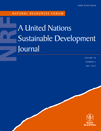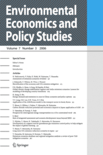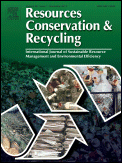
NATURAL RESOURCES FORUM
Scope & Guideline
Empowering knowledge for environmental stewardship.
Introduction
Aims and Scopes
- Interdisciplinary Research on Natural Resources:
The journal emphasizes interdisciplinary studies that integrate economics, environmental science, political science, and technology to address challenges related to natural resource management. - Sustainability and Environmental Impact Analysis:
A core focus is on evaluating the environmental impacts of resource extraction, usage, and policy decisions, aiming to promote sustainable practices that mitigate ecological degradation. - Economic Development and Resource Management:
The journal explores the relationship between economic growth and natural resource utilization, assessing how resource wealth can be leveraged for sustainable economic development. - Global Perspectives on Resource Governance:
Research often highlights the role of governance, institutional quality, and policy frameworks in managing natural resources effectively, particularly in developing and transition economies. - Technological Innovations in Resource Utilization:
A significant scope includes the assessment of technological advancements and innovations that can enhance the efficiency and sustainability of resource use.
Trending and Emerging
- Green Technology and Innovation:
There is a notable increase in research related to green technologies and their role in promoting sustainability, reflecting a global push towards innovation in environmental practices. - Climate Change and Resilience Strategies:
Emerging themes focus on climate adaptation strategies, resilience building, and the socio-economic impacts of climate change, indicating a growing recognition of these issues. - Integration of Digital Technologies in Resource Management:
The incorporation of digital technologies, including data analytics and ICT, in managing natural resources is trending, emphasizing the role of technology in enhancing efficiency and sustainability. - Sustainable Finance and Investment Models:
Research on sustainable finance, including the role of financial development in fostering environmental sustainability, is increasingly prominent, reflecting a shift towards integrating finance with environmental goals. - Globalization and Resource Management Interactions:
Studies examining the interactions between globalization, trade policies, and natural resource management are on the rise, highlighting the complexities of global interdependencies in resource utilization.
Declining or Waning
- Traditional Resource Extraction Techniques:
Research focusing solely on conventional methods of resource extraction has seen a decrease, as the journal shifts toward innovative and sustainable approaches. - Narrow Economic Analyses without Environmental Context:
There is a waning interest in studies that analyze economic growth in isolation from environmental impacts, reflecting a broader trend that favors integrated analyses. - Overemphasis on Policy Without Empirical Evidence:
Papers that propose policies without robust empirical backing are becoming less frequent, as the journal increasingly values data-driven research. - Localized Case Studies with Limited Generalizability:
Studies focused on very localized contexts without broader implications are declining, as the journal seeks research that offers insights applicable to wider contexts or regions.
Similar Journals

ENVIRONMENTAL MANAGEMENT
Driving change through evidence-based environmental strategies.ENVIRONMENTAL MANAGEMENT, published by Springer, stands at the forefront of advancing sustainability and ecological stewardship in the fields of Ecology, Global and Planetary Change, and Pollution. With an impressive tracking history from 1977 to 2024 and prestigious quartile rankings reflecting its significant impact (Q1 in Ecology and Q2 in both Global and Planetary Change and Pollution), this journal engages a wide range of stakeholders, including researchers, policymakers, and environmental professionals. The journal is a vital resource for those dedicated to addressing pressing global environmental challenges, publishing rigorous interdisciplinary research that informs policy and practice. While it does not offer open access, its content remains accessible through institutional subscriptions. Located in the heart of New York, ENVIRONMENTAL MANAGEMENT is dedicated to fostering a substantive dialogue on innovative approaches to environmental preservation and management.

GLOBAL JOURNAL OF ENVIRONMENTAL SCIENCE AND MANAGEMENT-GJESM
Leading the way in environmental discourse and innovation.Global Journal of Environmental Science and Management (GJESM), published under the distinguished leadership of Professor J. Nouri, is an esteemed academic platform dedicated to advancing the interdisciplinary discourse surrounding environmental science and management. With an ISSN of 2383-3572 and an E-ISSN of 2383-3866, GJESM has established itself as a prominent Open Access journal since 2014, allowing for unrestricted sharing of knowledge and research findings. Based in Iran, this journal caters to a diverse global audience, featuring contributions that span various critical domains including agricultural and biological sciences, environmental engineering, pollution management, and social sciences, evidenced by its impressive 2023 Q1 and Q2 quartile rankings across multiple categories. The journal’s Scopus rankings demonstrate a robust standing in the academic landscape, with exciting placements that underscore its relevance in key fields. By bridging the gap between scientific inquiry and practical application, GJESM serves as a vital resource for researchers, practitioners, and students seeking to understand and address the pressing environmental challenges faced by our planet today.

Environmental Economics and Policy Studies
Uniting Economics and Ecology for Lasting ImpactEnvironmental Economics and Policy Studies is a premier academic journal published by SPRINGER, focusing on the intersection of environmental sustainability and economic policy. With a robust ISSN of 1432-847X and an E-ISSN of 1867-383X, this journal serves as a vital resource for researchers, policymakers, and practitioners looking to understand and address the complex issues surrounding environmental economics. Hailing from Japan, it has carved a significant niche in the field since its inception, achieving impressive rankings with a Q2 classification in both Economics and Econometrics, as well as Management, Monitoring, Policy and Law as of 2023. The journal publishes a wide array of high-quality articles, with an emphasis on empirical research and innovative methodologies that influence public policy and economic decision-making. Notably, its Scopus rankings reflect a respectable position within its disciplines, with a percentile ranking of 74th in Economics and Econometrics. The journal continues to contribute to the discourse on sustainable development with a commitment to fostering interdisciplinary research and understanding. Access to this invaluable resource is available through traditional subscription models, making it an essential addition to academic collections for those passionate about the advancement of environmental economics.

RESOURCES CONSERVATION AND RECYCLING
Empowering change in resource conservation and recycling.RESOURCES CONSERVATION AND RECYCLING, published by Elsevier, is an esteemed journal that has been at the forefront of academic discourse since its inception in 1988. Focusing on the critical fields of resource management, recycling, and sustainability, this journal has established itself as a leading platform for innovative research, holding a prestigious position in the Q1 quartile for both Economics and Econometrics, and Waste Management and Disposal. With a remarkable Scopus ranking of #4 in its respective categories, it represents the pinnacle of scholarly contributions, aimed at fostering knowledge that drives efficient resource utilization and effective waste management practices. The journal's commitment to advancing the understanding of economic implications and environmental impacts of resource conservation is reflected in its diverse array of articles, case studies, and reviews. Although it is not an open-access journal, the valuable insights it offers are essential for researchers, professionals, and students who are dedicated to addressing pressing environmental challenges and enhancing sustainable practices on a global scale.

Economic and Environmental Geology
Advancing Knowledge at the Intersection of Geology and EnvironmentEconomic and Environmental Geology is a peer-reviewed journal published by the Korea Society for Economic & Environmental Geology, focusing on critical intersections within the fields of economic geology and environmental science. With an ISSN of 1225-7281 and an E-ISSN of 2288-7962, this journal serves as a vital platform for researchers, professionals, and students engaged in the comprehensive study of geological resources and their impacts on the environment. As of 2023, the journal is categorized in the Q4 quartile for both Economic Geology and Environmental Science, indicating its emergent impact in these domains. Despite being in the early stages of its convergence from 2017 to 2024, the journal holds importance for advancing knowledge and fostering discussions about sustainable geological practices in South Korea and beyond. The journal does not currently offer open-access options, but it continues to provide essential insights into the challenges and innovations within economic and environmental geology.

Bio-based and Applied Economics
Empowering Policymakers with Evidence-Based InsightsBio-based and Applied Economics, an esteemed journal published by FIRENZE UNIV PRESS, is an open-access platform dedicated to the dissemination of innovative research and critical reviews in the interdisciplinary areas of agronomy, animal science, and food science, with a strong emphasis on the economic and environmental implications of bio-based applications. Since its inception in 2012, the journal has positioned itself as a valuable resource for academics and professionals alike, boasting a commendable Q2 ranking across various fields, including Economics, Environmental Science, and Applied Biological Sciences. With its notable impact factor and commitment to accessible research, it aims to foster knowledge exchange and stimulate advances in bio-economy practices. This journal not only contributes significantly to scholarly discourse but also serves as a crucial tool for policymakers and industry leaders seeking evidence-based solutions to contemporary challenges in sustainability and resource management.

Natural Resources Research
Exploring innovative strategies for natural resource stewardship.Natural Resources Research is a premier academic journal that plays a vital role in advancing the field of environmental science, particularly in the management and sustainable use of natural resources. Published by Springer, the journal boasts an impressive impact factor and is currently ranked in the Q1 quartile for Environmental Science, reflecting its significant contribution to knowledge and research in this domain. With a notable ranking of #21/233 in the general environmental science category and a remarkable 91st percentile, it serves as a reputable platform for researchers, professionals, and students seeking to publish and access high-quality research. The journal's archival span from 1996 to 2024 underscores its longstanding commitment to addressing pressing environmental issues, facilitating robust discussions on natural resource policy, conservation strategies, and innovative technological advancements. While the journal is not open access, it ensures wide dissemination of its content, bolstering the critical dialogue necessary for enhanced understanding and action in the field. Natural Resources Research continues to be an essential resource for those dedicated to sustainability and the responsible stewardship of our planet's resources.

Environmental and Planning Law Journal
Navigating the Nexus of Law and EnvironmentEnvironmental and Planning Law Journal is a significant publication in the fields of law and environmental studies, published by LAWBOOK CO LTD in Australia. This journal, with the ISSN 0813-300X, has established itself as a crucial resource since its inception in 1984, providing a platform for scholarly discourse around legal frameworks affecting environmental planning and policy. Despite its coverage discontinuation in databases like Scopus, its impact remains recognized, achieving a rank of #455 in the Social Sciences Law category, indicating its relevance in legal scholarship. The journal is classified in the lower quartiles, yet it continues to address vital issues in geography, planning, and management of environmental law, engaging with contemporary challenges faced by policy-makers and practitioners. With no open access options currently available, the journal invites subscriptions and institutional access for its valuable content, making it a notable cornerstone for researchers, students, and professionals dedicated to navigating the complexities of environmental law and planning.

Observatorio Medioambiental
Exploring Solutions for Contemporary Environmental ChallengesObservatorio Medioambiental is a premier journal dedicated to advancing the understanding of environmental science and policy, published by UNIV COMPLUTENSE MADRID, SERVICIO PUBLICACIONES. With a strong commitment to scholarly excellence, this journal serves as a vital platform for researchers, professionals, and students interested in addressing contemporary environmental challenges through interdisciplinary studies. Although currently not listed as an Open Access journal, it maintains high academic standards, ensuring that published research contributes significantly to the field. The journal fosters the dissemination of knowledge regarding ecological conservation, sustainable development, and environmental management practices. By providing a rigorous peer-reviewed environment, Observatorio Medioambiental plays a crucial role in shaping informed and sustainable environmental policies and practices on both local and global scales.

Resources-Basel
Championing open access for global environmental dialogue.Resources-Basel is a premier open access journal published by MDPI, specializing in the fields of environmental science, management, and landscape conservation. Since its inception in 2012, the journal has established itself as a reputable source of scholarly research and discourse, achieving notable rankings including Q2 in Management, Monitoring, Policy and Law and Q1 in Nature and Landscape Conservation as of 2023. With impressive Scopus rankings, including a 27th place in the category of Environmental Science focused on Nature and Landscape Conservation, and a 82nd in Management, Monitoring, Policy and Law, Resources-Basel plays a crucial role in advancing knowledge and best practices within these vital domains. Based in Basel, Switzerland, the journal embraces the open access model, ensuring that research is widely accessible to scholars, practitioners, and the public alike, catering to the pressing issues of sustainable resource management and environmental conservation. Researchers, professionals, and students are encouraged to engage with the latest findings published here, contributing to the global discourse on sustainable practices and policy innovation.